The Metaverse Sounds Hauntingly Awful
...in these three terrible, horrible, no-good ways.
Hello! This is Everything Is Amazing, a newsletter about curiosity: the science of it, the enthusiastically applied idiocy of it, and, occasionally, the maps, rainbows and floating cities in the sky of it.
If all of that sounds like nonsense, reading this may help! It also may not. Welcome to the kind of newsletter this is.
Or if you haven’t already done so, you could just subscribe and find out the hard way:
Also, a special hello to those of you who are part of the small flood of new subscribers because Doug, author of Snack Stack and two fabulously curious books, was just interviewed by Substack for Halloween, and, presumably in a moment of pure confusion, recommended me to readers as well.
Doug’s an impossible act to follow! But I hope to keep your disappointment to a minimum.
Today, a bit later than planned (apologies for that), I’m breaking with tradition with a small rant, before I get back to business as usual on Wednesday.
I’m not a good ranter, so this newsletter isn’t the ranty type. I can’t pretend to be relevant, or provide pithy cultural commentary in a Anne Helen Petersen fashion, and the only time I have my ear to the ground is when I’ve tripped over something.
Nevertheless, this week I have Some Thoughts About A Thing That Just Happened - and since they tie in with the guiding themes of this newsletter, off we will shortly go.
Before I do that: if you’d prefer reading something timeless, witty and inspiring, try Brendan Leonard’s ode to Wikipedia, which will make you feel better in places you weren’t even aware were feeling bad:
Or if you get a kick from immersing yourself in the wildly unconventional biographies of others, try this story of Joe Carstairs, courtesy of Valorie at Unruly Figures.
My point is, you may prefer those things to what I’m about to do, which is this:
Okay. Let’s talk about a billionaire’s depressing vision of our digital future.
A few days ago, Facebook’s parent company (also called Facebook) changed its name to Meta, and Mark Zuckerberg released a video outlining his vision for what he calls the Metaverse: a seamless network of virtual experiences that’ll try to create the perpetual illusion you’re “inside” the Internet while you’re online.
I’ve posted that video up there, but really, I’m deeply conflicted about inviting you to watch anything but the first 5 minutes. If you’re a fan of shiny new tech, it’s fascinating. If you’re a human being with an above-zero intolerance for corporate cringe, it’s frequently a really hard watch.
This isn’t a roast, though. I have no wish to attack Zuckerberg for his presentation skills, because I’ve done speaking in front of hundreds of people and that ruined me for a week. Here, he’s addressing millions. Who knows what state he’s in as I write this? (I reckon he’ll be doing a lot of surfing from here until Christmas.)
Instead, this is about what he said. A few things in particular, which sounded horrifying. Properly dystopian, if I’m hearing them right - which is why I haven’t been able to get them out my head for days, and why I pushed back a newsletter I was writing for the weekend, so I could write this instead.
Let us count three awful, haunting ways this is the hardest of Nopes.
It’s Not Real, Mark.
When I wake up my laptop every morning, I see a view of Greece. That’s how I’ve set it up: a little burst of “ahhh, I really wish I was back there” to propel me into my working day.
The Metaverse will go much further. By going online (presumably by popping on some kind of headset that you quickly forget is there), the real windows of your house will dissolve away to show the scenic vista of your choice. Meanwhile, other parts of your home will be spruced up, any way you choose: virtual maps, virtual furniture, virtual windows showing entirely different landscapes, and so on.
This has been a standard trope in scifi for the last half-century. And the reason it’s endured is that it should look amazing.
VR headsets are already a thing in videogaming, and I’ve tried one, and it astonished me. If that’s where we are right now, the eventual Metaverse version could look overwhelming.
Zuckerberg’s presentation zooms in on this. He strolls through an augmented version of his house, and at first, what he’s saying is really encouraging:
“This isn’t about spending more time on screens - this is about making the time that we spend better. Screens just can’t convey the full range of expression and connection…they can’t convey a deep feeling of presence.”
YES. Fantastic. I mean, it flies in the face of Facebook’s entire strategy to date, but maybe this is what he really thinks? Maybe the Metaverse is about gently guiding people towards those serendipitous offline experiences that really make life worth…
“We’re going to be able to feel present, like we’re right there with people, no matter how far apart we actually are…”
That - uh, that’s a tall order! But okay, I guess. So what about encouraging the offline…
“An embodied Internet…you’re going to really feel like you’re there with other people.”
To illustrate this, Zuckerberg fashions an avatar - basically a skinny, airbrushed teenage version of himself - and goes to his living room to meet some similar avatar-clad friends for some painfully scripted-looking hijinks and forced chat.
This, we’re being told, is “being present” with our friends. Never mind that Facebook already knows that its services create huge body image issues for kids. “Thirty-two per cent of teen girls said that when they felt bad about their bodies, Instagram made them feel worse,” went an internal report in March 2020, part of a recently-leaked trove of documents that’s come to be known as the Facebook Papers. No - it’s fine because in this version of the future, we’ll all be cartoons? So, er…
Anyway, that beautiful virtual landscape outside our bedroom window, though. Nature in all its glory. Isn’t it great?
Not quite. It just looks great. If it was actually great, we’d be feeling all the benefits of being out in the natural world, as outlined by science writer Florence Williams in her recent book The Nature Fix.
Some excerpted findings (source):
As little as 15 minutes in the woods has been shown to reduce test subjects’ levels of cortisol, the stress hormone.
Increase nature exposure to 45 minutes, and most individuals experience improvements in cognitive performance.
Researchers in England have shown that access to green spaces reduces income-related mental health disparities.
Aerosols present in evergreen forests act as mild sedatives while also stimulating respiration.
Water and birdsong have been proven to improve mood and alertness.
Nature’s benefits might be due to something as simple as the fact that natural landscapes are, literally, easy on the eyes. Many of nature’s patterns —raindrops hitting a pool of water or the arrangement of leaves —are organized as fractals, and the human eye moves in a fractal pattern while taking in a view. Such congruence creates alpha waves in the brains —the neural resonance of relaxation. (This sounds like an argument for VR depictions of nature - but this study has shown no increase in positive mood levels from using VR like this.)
Most people get a lot of benefit from city parks and as little as five hours a month does the trick.
Awe, which many people experience in nature, is, according to one study, associated with increased generosity toward other people.
There is also the not-small matter of us having to preserve these things that impact our health so beneficially, because right now, we’re doing the opposite of that, with the ecology-ravaging polluting and the heartbreaking extinctions and so on. And the climate clock is ticking down as a result. And we should probably have some kind of conference about it - ah, yes, exactly like that. Good start. Carry on.
What we need from the Metaverse is technology that encourages us to go outside, to form a deeper relationship with the actual natural world around us, and to start caring about it so much that we take action and learn how to slam the brakes on the wheels of this runaway train.
(A good start: holding politicians fully accountable to their promises. Just an idea.)
What we definitely don’t need is to stay indoors, using technology to pretend there’s nothing wrong with the view from our window.
But Where’s All Your Money, Mark?
One thing noticeably missing from Zuckerberg’s presentation was his company’s entire business model.
In 2020, Facebook made $86bn in revenue. Of that staggering amount, 98% came from Facebook Advertising, via advertisers paying Facebook to show ads to its 3 billion users across Facebook, Instagram and WhatsApp. (That’s according to Facebook’s annual report filed in Washington D.C.)
And yet Zuckerberg’s idyllic Metaverse has nary an advert in sight.
Does this mean Facebook…I mean Meta is going to throw away its wildly successful business model and pivot to something gentler, kinder, less invasive & awful?
Of course not. And that means ads will be baked into every aspect of the Metaverse. If you’re a free user, the ads are going to be everywhere - as in, plastered all over your virtually enhanced home. They’re going to render things like tables and chairs unusable until you click or swipe the ads away. That lovely view? It’s going to be travel advertising, at least at first, until you irritatedly wait for the timer to go down so you can yank the damn thing off your windows and stand there, fighting to get your Zen back before the next unsolicited ad-storm appears…
You know what’s so great about screens when the ads get too much? They’re great because you can look away. Ah. Isn’t that nice? No ads.
That’s not how virtual reality will work in practice. You will have to step right out of VR to get rid of them. Because they will be everywhere, all the time. And of course Mark Zuckerberg knows it.
And yet his presentation pretends otherwise.
This is what traditional scifi calls “Appearing Quite Evil”.
*deep breath* But It Isn’t Real, Can You See How That Might Be A Problem Here, Mark?
Meta’s new logo appears to be an infinity sign, except wilted. This feels entirely appropriate.
The language Zuckerberg is using through his presentation is careful but highly suggestive. It’s saying that Yes, many online things are terrible, but we’re going to fix them to the point you will want to do everything with this. You’ll want to do business in it. You’ll want to socialise in it. Put your lame family board games away because these games will be fantastic.
Again and again, he implicitly hammers this home. Despite his initial diclaimer that he doesn’t want you “spending more time on screens,” he shows you all the ways he thinks you’ll actually want to. It’s not subtle.
But there’s one bit in particular that freaked me out. Zuckerberg talks about how everything will have its Metaverse version of a chatroom, which will be an entire VR world. Your business’s world. Your best friend’s world. Your world, where you can bring friends. Your game’s world. And in the blink of an eye, you will be able to teleport between them.
Sounds great, right?
There’s a scifi short story I read once (I wish I knew where) which had something similar - except it was real teleportation. Teleport tech had changed everything. You stepped through a doorway and you stepped out another one halfway round the world, or across town, or in the house next door. The flipside of this convenience: everyone was mentally and physically unhealthy and heavily medicated because everyone had stopped going “outside”. The Outdoors had become a terrifying, uncontrollable place filled with danger & horror, a little like how the British countryside used to be seen back in the days of Thomas Hardy. Always feared, always bypassed.
So nobody ever went through…where their front door used to be, before houses started being built without them. Nobody went outside. Ever.
(Except one person, of course: the hero of the story, which starts as they make that fateful decision to break their way through the wall to see what’s surrounding the “inner world”.)
Could the Metaverse encourage something similar? Days or even weeks where you don’t really need to leave the house, and you’re getting just enough fake stimulation to drown out the increasingly clamouring needs of your physical body, until…?
Look. I enjoy using the online world. Even Facebook! It’s not great, but it’s also not Super-Bad. As an archaeology student I studied the past, and let me tell you, today is pretty damn good in comparison to a lot of history:
But the thing that’s really messed with my normally sloth-like composure is something I’ve learned from playing too many videogames.
I have spent nearly 40 years playing games on home computers, from my first fumblings on Manic Miner on the ZX Spectrum all the way to the *cough cough* hours I’ve put into The Elder Scrolls: Skyrim.
Like most gamers, I’ve frequently butted up against the limits of believability in whatever I’m playing. There’s always a point where, however skillful the game designer is, it suddenly just feels like a game. I don’t mean “just” in a sniffy, dismissive way, because the journey to this point is usually an artfully-designed and rewarding one (otherwise I & millions of other players wouldn’t have persevered so many times). But beyond here, the spell, however convincingly cast, is permanently broken. It’s clearly not real.
What does this word mean, “real”? In the context of this newsletter, it means Filled With Endlessly Interesting Stuff You Have No Idea You Don’t Know. (Hence the need for applied curiosity, to try to stumble over it.)
And part of the reason for this is that the physical world around us wasn’t designed by humans. Yes, some stuff in it certainly is - but they didn’t design reality itself.
Virtual worlds are most definitely designed by humans. This means they’re limited to what the human imagination is capable of cooking up, and the human-made computing hardware that can make it happen. In every way, a virtual world is anthropocentric. It’s by, & for, human beings.
The actual world, on the other hand, has a wonderful and occasionally disturbing tendency to ignore our wishes and surprise us in its unfathomable complexity, boundless novelty and awe-inspiring beauty. It is a mystery that we will never get to the bottom of, and most days, that’s kinda why life is worth living.
Zuckerberg’s Metaverse, on the other hand, is a million miles wide and just one pixel deep. All the mysteries will already be solved (apart from the bugs - they may be the only true surprises left). The Metaverse will ultimately be devoid of awe and wonder in exactly the opposite way the real world is ultimately brimming with them, if you just put your headset down and go discover a way to see them.
It’s therefore regrettable that Zuckerberg’s vision seems to be of something pointing inward, into these confected human pseudo-worlds, and not outwards, towards the infinite capacity for serendipity and joy provided by the amazing world around us.
My friend Tom nailed this point perfectly:
…even if he did it in a Facebook comment. (Oh well. Also: I am clearly that nutter today.)
So no, Mr Zuckerberg. Thanks but absolutely no thanks. I’m open to being convinced out of how I feel here, but damn, I’m feeling it so hard. Your energy is certainly admirable, but your facial expressions are…confusing, and your ideas are pretty wretched.
I hope you’ll forgive me as I keep yelling at this particularly noxious cloud you’ve guffed into the world, and keep steering everyone I know towards something else (but in particular, towards the joy of exploring where you actually are).
I like your surfboard though. Always wanted to give that a go.
Maybe see you out there sometime?





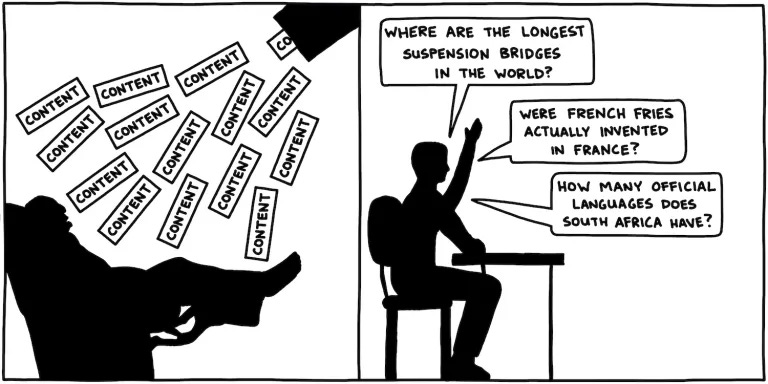

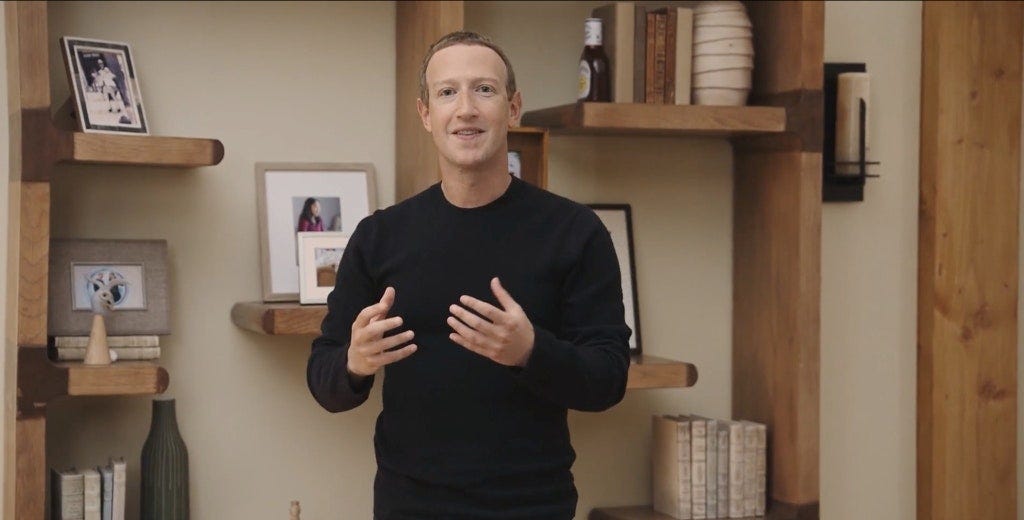
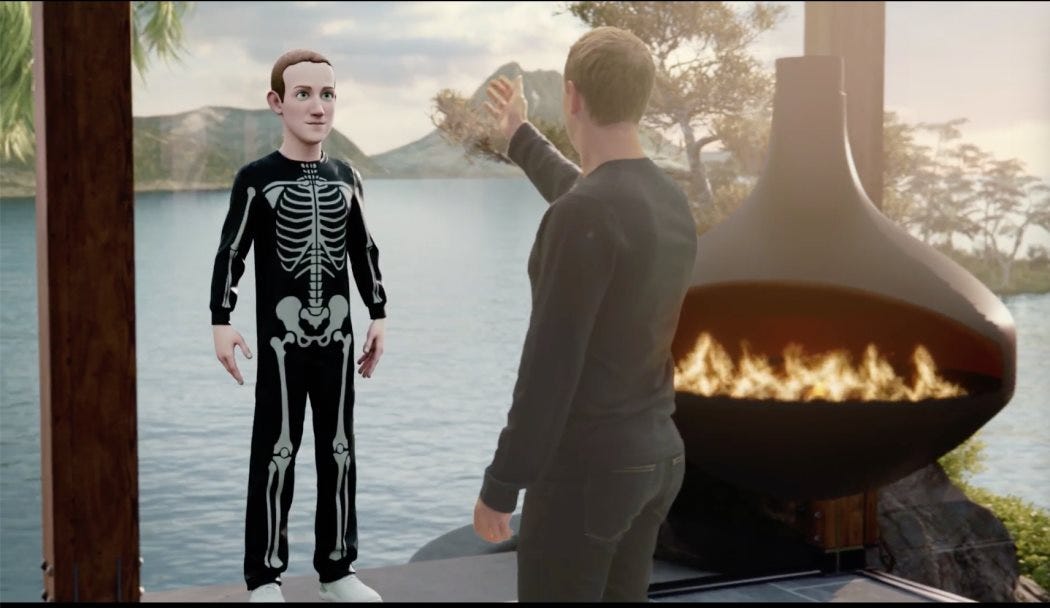

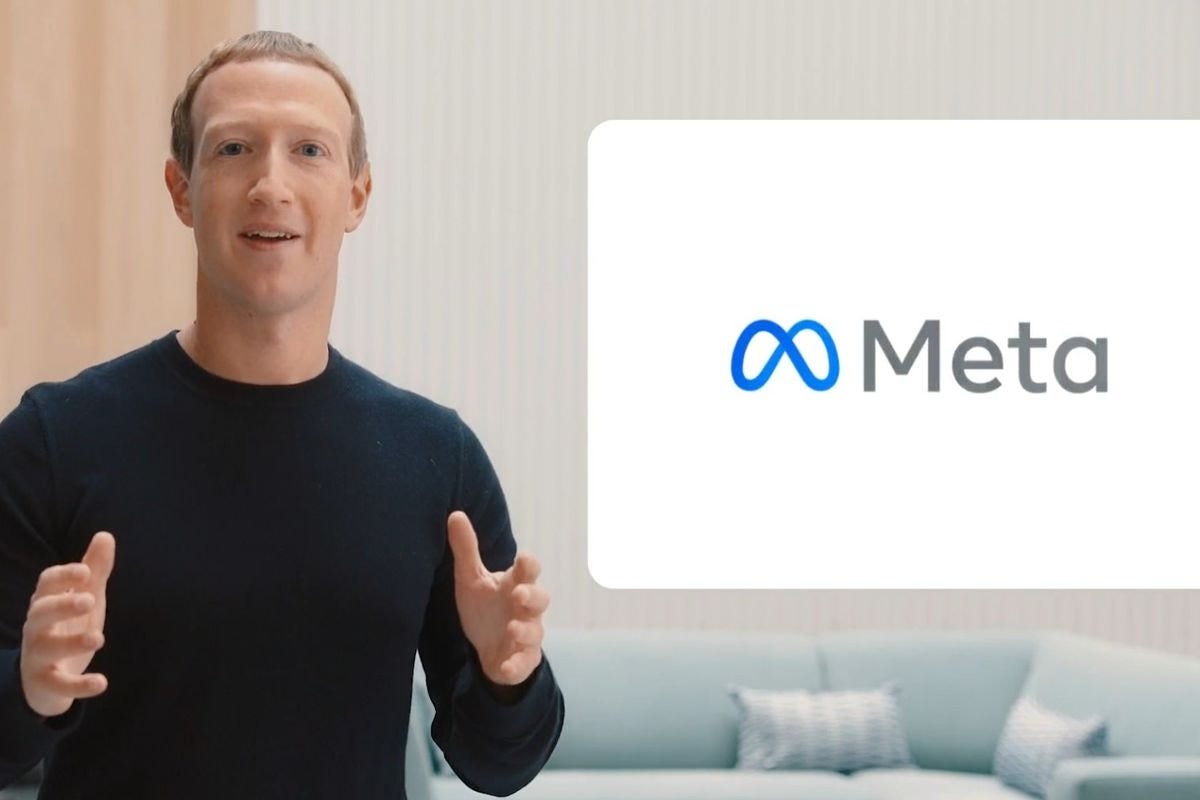

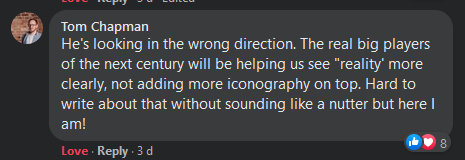
It feels like someone in their development team read Ready Player One and slightly missed the point.
Massive, wild applause to this, Mike. Surely a year stuck at home will have taught us we don't need a virtual life, but a real one? She says hopefully....